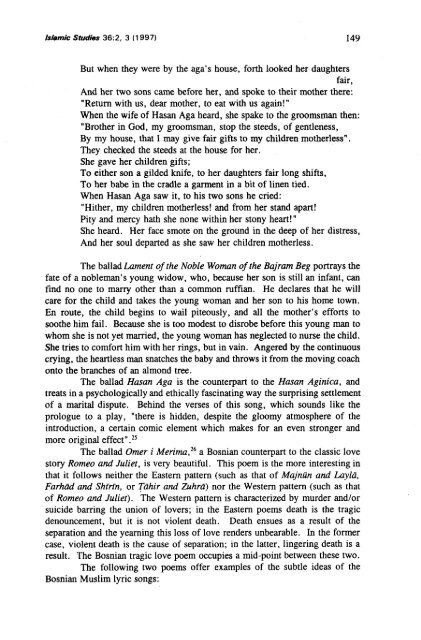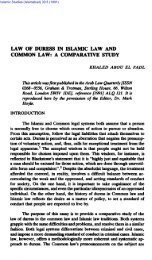Create successful ePaper yourself
Turn your PDF publications into a flip-book with our unique Google optimized e-Paper software.
lslernic Studies 36:2, 3 (1 997) 149<br />
But when they were by the aga's house, forth looked her daughters<br />
fair,<br />
And her two sons came before her, and spoke to their mother there:<br />
"Return with us, dear mother, to eat with us again!"<br />
When the wife of Hasan Aga heard, she spake to the groomsman then:<br />
"Brother in God, my groomsman, stop the steeds, of gentleness,<br />
By my house, that I may give fair gifts to my children motherless".<br />
They checked the steeds at the house for her.<br />
She gave her children gifts;<br />
To either son a gilded knife, to her daughters fair long shifts,<br />
To her babe in the cradle a garment in a bit of linen tied.<br />
When Hasan Aga saw it, to his two sons he cried:<br />
"Hither, my children motherless! and from her stand apart!<br />
Pity and mercy hath she none within her stony heart! "<br />
She heard. Her face smote on the ground in the deep of her distress,<br />
And her soul departed as she saw her children motherless.<br />
The ballad Lament of the Noble Woman of the Bajram Beg portrays the<br />
fate of a nobleman's young widow, who, because her son is still an infant, can<br />
find no one to marry other than a common ruffian. He declares that he will<br />
care for the child and takes the young woman and her son to his home town.<br />
En route, the child begins to wail piteously, and all the mother's efforts to<br />
soothe him fail. Because she is too modest to disrobe before this young man to<br />
whom she is not yet married, the young woman has neglected to nurse the child.<br />
She tries to comfort him with her rings, but in vain. Angered by the continuous<br />
crying, the heartless man snatches the baby and throws it from the moving coach<br />
onto the branches of an almond tree.<br />
The ballad Hasan Aga is the counterpart to the Hasan Aginica, and<br />
treats in a psychologically and ethically fascinating way the surprising settlement<br />
of a marital dispute. Behind the verses of this song, which sounds like the<br />
prologue to a play, "there is hidden, despite the gloomy atmosphere of the<br />
introduction, a certain comic element which makes for an even stronger and<br />
more original effect" .25<br />
The ballad Omer i Merima,26 a Bosnian counterpart to the classic love<br />
story Romeo and Juliet, is very beautiful. This poem is the more interesting in<br />
that it follows neither the Eastern pattern (such as that of Majnun and Layla,<br />
Farhad and Shin-n, or Tahir and Zuhra) nor the Western pattern (such as that<br />
of Romeo and Juliet). The Western pattern is characterized by murder and/or<br />
suicide barring the union of lovers; in the Eastern poems death is the tragic<br />
denouncement, but it is not violent death. Death ensues as a result of the<br />
separation and the yearning this loss of love renders unbearable. In the former<br />
case, violent death is the cause of separation; in the latter, lingering death is a<br />
result. The Bosnian tragic love poem occupies a mid-point between these two.<br />
The following two poems offer examples of the subtle ideas of the<br />
Bosnian Muslim lyric songs:
















